|
|
|
Sort Order |
|
|
|
Items / Page
|
|
|
|
|
|
|
| Srl | Item |
| 1 |
ID:
086169
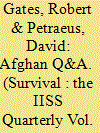

|
|
|
|
|
| Publication |
2009.
|
| Summary/Abstract |
My question is about Afghanistan. You described the challenges and some of the responses, but I would like you to go into more detail about what you expect other nations to contribute in military terms. Since I am a European, what would you expect European partners and allies of the United States to be contributing? More generally, what would you consider to be the appropriate balance, the appropriate policy mix, between the military surge on the one hand, and the political and economic efforts in Afghanistan and in the region on the other hand?
|
|
|
|
|
|
|
|
|
|
|
|
|
|
|
|
| 2 |
ID:
192396
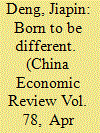

|
|
|
|
|
| Summary/Abstract |
By incorporating imprinting theory into a political–economic framework, this paper studies the role of local political leaders in poverty reduction. Exploiting exogenous turnovers of city-level party secretaries in China, I find that city secretaries with early-life poverty experiences are more likely to increase the incomes of poor families in their jurisdictions. I further find that the effect of city secretaries' poverty experiences on the income of the poor is more pronounced in the counties that are not officially categorized as impoverished by the central government and among the families living above the poverty line set by the Chinese government but below the international poverty line proposed by the World Bank. It is suggested that local political leaders affect poverty reduction outcomes by instilling their personal preferences, which can be shaped by their early experiences, into their economic decisions.
|
|
|
|
|
|
|
|
|
|
|
|
|
|
|
|
| 3 |
ID:
129560
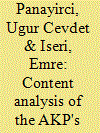

|
|
|
|
|
| Publication |
2014.
|
| Summary/Abstract |
This article examines political leaders' framing strategies during times of public diplomacy crisis. By focusing on the nexus of domestic-international politics, it argues that during public diplomacy crises, policy-makers would like to utilize their speech acts on foreign policy issues to manage expectations of domestic public opinion. This paper's main contention is to demonstrate that the head of AKP (Adalet ve Kalk?nma Partisi) government, Recep Tayyip Erdo?an, has instrumentalized his foreign policy speeches with the label of "honorable" to legitimize AKP's practices at the domestic level.
|
|
|
|
|
|
|
|
|
|
|
|
|
|
|
|
| 4 |
ID:
124311
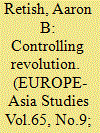

|
|
|
|
|
| Publication |
2013.
|
| Summary/Abstract |
This essay is a study of how Soviet jurists and rural citizens attempted to understand and control illicit social violence during the Civil War and its immediate aftermath in the rural courts. It examines how Soviet leaders, people's courts and criminologists understood the role of the courts in controlling violence and how decisions of local courts actually limited the effects of the violence of revolution and civil war. It underscores the complexity of violence and the need to understand state and peasant attempts to control social violence in an age marked by political, state violence.
|
|
|
|
|
|
|
|
|
|
|
|
|
|
|
|
| 5 |
ID:
124397
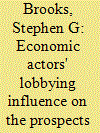

|
|
|
|
|
| Publication |
2013.
|
| Summary/Abstract |
Political scientists and economists have long been interested in the role of special interests in the policymaking process. In the past few years, a series of important new books have argued forcefully that the lobbying activities of economic actors have an important influence on the prospects for war and peace. All of these analyses claim that whether economic actors enhance or decrease the likelihood of conflict ultimately depends on the domestic political balance between economic actors who have a strong vested interest in pushing for peace versus those that do not. I advance two contrary arguments. At least among the advanced states, I posit there are no longer any economic actors who will be favorable toward war and who will lobby the government with this preference. All of the identified mechanisms that previously contributed to such lobbying in these states have been swept away with the end of colonialism and the rise of economic globalization. In particular, I show that the current structure of the global economy now makes it feasible for foreign direct investment to serve as an effective substitute for conquest in a way that was not possible in previous eras. My second argument concerns those economic actors in advanced states with a preference for peace. I posit that it has become unnecessary for them to directly lobby the government to avoid war on economic grounds because economic globalization-the accumulation of decisions by economic actors throughout the globe-now has sufficiently clear economic incentives for leaders.
|
|
|
|
|
|
|
|
|
|
|
|
|
|
|
|
| 6 |
ID:
116626
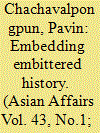

|
|
|
|
|
| Publication |
2012.
|
| Summary/Abstract |
This article draws on the concept of historical overhang, which essentially refers to the way in which negative historical memories both inform and influence public perceptions as well as those of policy makers. It is the manner in which perceptions drawn from historical episodes are interpreted that makes them enduring. The distortion of history and the misuse of nationalism are mainly responsible for the endurance of historical overhangs in Thai-Cambodian relations, particularly when political leaders encountered legitimacy crises at home. The article investigates two major causes of the recent severe deterioration in Thai-Cambodian bilateral ties- the conflict over the disputed Preah Vihear Temple and the clash between the Thaksin-Hun Sen alliance and the Abhisit Vejjajiva government and makes the contrast with the sudden improvement in relations after Abhisit's electoral defeat.
|
|
|
|
|
|
|
|
|
|
|
|
|
|
|
|
| 7 |
ID:
133864
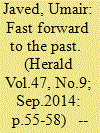

|
|
|
|
|
| Publication |
2014.
|
| Summary/Abstract |
The politics of the nineties is back upon and so is military power
|
|
|
|
|
|
|
|
|
|
|
|
|
|
|
|
| 8 |
ID:
065769
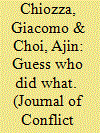

|
|
|
| 9 |
ID:
122084
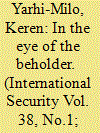

|
|
|
|
|
| Publication |
2013.
|
| Summary/Abstract |
How do policymakers infer the long-term political intentions of their states' adversaries? A new approach to answering this question, the "selective attention thesis," posits that individual perceptual biases and organizational interests and practices influence which types of indicators a state's political leaders and its intelligence community regard as credible signals of an adversary's intentions. Policymakers often base their interpretations on their own theories, expectations, and needs, sometimes ignoring costly signals and paying more attention to information that, though less costly, is more vivid (i.e., personalized and emotionally involving). In contrast, intelligence organizations typically prioritize the collection and analysis of data on the adversary's military inventory. Over time, these organizations develop substantial knowledge on these material indicators that they then use to make predictions about an adversary's intentions. An examination of three cases based on 30,000 archival documents and intelligence reports shows strong support for the selective attention thesis and mixed support for two other approaches in international relations theory aimed at understanding how observers are likely to infer adversaries' political intentions: the behavior thesis and the capabilities thesis. The three cases are assessments by President Jimmy Carter and officials in his administration of Soviet intentions during the collapse of détente; assessments by President Ronald Reagan and administration officials of Soviet intentions during the end of the Cold War; and British assessments of Nazi Germany before World War II.
|
|
|
|
|
|
|
|
|
|
|
|
|
|
|
|
| 10 |
ID:
149465
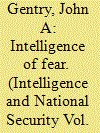

|
|
|
|
|
| Summary/Abstract |
Intelligence agencies long have brought unwelcome news to civilian political and military masters – and sometimes suffered severely for it. Even in Western democracies, insecurities and outright fear produce behavioral responses by individuals and defensive institutional reactions that distort normal intelligence activities and affect the overall performance of intelligence agencies. Causes of fear include: political leaders, overseers, agency managers, and the security elements of their organizations. This article highlights the importance of institutional factors, especially organizational cultures and incentives, on the activities and overall performance of intelligence agencies and suggests that motivated biases, caused by personal and organizational self-interest and fears, are more significant causes of intelligence failures than are commonly believed.
|
|
|
|
|
|
|
|
|
|
|
|
|
|
|
|
| 11 |
ID:
122915


|
|
|
|
|
| Publication |
2013.
|
| Summary/Abstract |
The massive amount of scientific and popular literature in the emerging field of "theory of intelligence" published over the past decades has been dedicated to analyzing the effects of intelligence organizations and their products in the political decisionmaking process. Different facets of the phenomenon are covered by using various analytical vehicles since a thorough analysis of its perplexities requires a multidisciplinary approach that includes expertise not only in political science but in sociology, psychology, history, and organizational and business management studies.
|
|
|
|
|
|
|
|
|
|
|
|
|
|
|
|
| 12 |
ID:
119041
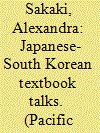

|
|
|
|
|
| Publication |
2012.
|
| Summary/Abstract |
One of the most notorious issues haunting Japanese-South Korean relations is the controversy over textbook depictions of Japan's colonial rule and war atrocities in the early twentieth century. In recent years, a number of bilateral projects have been launched on both the non-governmental and governmental level, seeking to narrow divergences in historical perceptions. Focusing on the Japanese side, this article assesses the impact of recent non-governmental textbook projects, arguing that these projects-while important and encouraging-have a limited capacity to prompt changes in educational policies. Textbook talks officially endorsed by the government and supported by a critical mass of politicians remain indispensable to promote a transnational reconstruction of the past. Based on a comparison between Japanese-South Korean and German-Polish government-backed talks, the paper identifies how decision makers can help foster an atmosphere conducive to the work of bilateral textbook commissions. It concludes that a key requirement for successful talks is that politicians, utilizing a variety of measures, pursue the dual goal of demonstrating high-level commitment to the talks and shielding the work proactively from nationalistic pressures. In contrast to their German counterparts, Japanese political elites have so far failed to pursue such an environment, casting doubts about progress in the textbook dispute for the foreseeable future.
|
|
|
|
|
|
|
|
|
|
|
|
|
|
|
|
| 13 |
ID:
123420
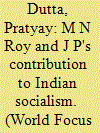

|
|
|
|
|
| Publication |
2013.
|
| Summary/Abstract |
Manendra Nath Roy (1886-1954) and Jayaprakash Narayan (1902-1979), both popularly known as M.N. Roy and J.P., occupy unique positions among the galaxy of political leaders produced by India in modern times. They played a major role not merely in the struggle for freedom from foreign rule, but also in shaping the minds of people as well as events after the achievement of our political freedom.
|
|
|
|
|
|
|
|
|
|
|
|
|
|
|
|
| 14 |
ID:
033258
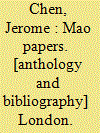

|
|
|
|
|
| Publication |
London, Oxford University Press, 1970.
|
| Description |
xxxiii, 221p.hbk
|
| Standard Number |
192151886
|
|
|
|
|
|
|
|
|
|
|
|
Copies: C:1/I:0,R:0,Q:0
Circulation
| Accession# | Call# | Current Location | Status | Policy | Location |
| 005516 | 951.05080/CHE 005516 | Main | On Shelf | General | |
|
|
|
|
| 15 |
ID:
133863
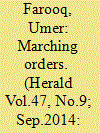

|
|
|
|
|
| Publication |
2014.
|
| Summary/Abstract |
The statement that came out of the corps commanders conference on Sunday, August 31 was a short one."…the conference reviewed with serious concern, the existing political crisis and the violent turn it has taken, resulting in large scale injuries and less of life," it read. "further use of force will only aggravate that problem," it added , "… the situation should be resolved politically without wasting any time and without wasting any time and without resorting to violent means.
|
|
|
|
|
|
|
|
|
|
|
|
|
|
|
|
| 16 |
ID:
133865
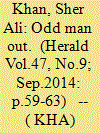

|
|
|
|
|
| Publication |
2014.
|
| Summary/Abstract |
The writer has discussed this controversial person from various angles. Though Qadri claims millions of his followers in all over the world , but this is not enough to grant him license to derail democracy and impose his specific sect teachings. I disagree that he is regarded as Shaikh Ul Islam , He doesn't even know ABC of true Islamic teaching. He is a sedition alone. The elected government should deal with iron hands with those who attacked PTV and Parliament House. ,this act of lawlessness indicates Qadri and Imran Khan have lost confidence and helpless , they can not be elected to be Prime Minister in future , Sit-In at Islamabad mounted anger and aggression against PTI and PAT. Thanks to Almighty Allah who disclosed their hidden intention before the nation. I am not supporter of PML(N) but the way PTI and PAT want to dump the elected government is wrong. I would like to advise to the so called Inqilabi and Azadi Leaders please sit down show your tolerance if you have ,let this government rule constitutional period than examine your strength and vote power in the next elections
|
|
|
|
|
|
|
|
|
|
|
|
|
|
|
|
| 17 |
ID:
164185


|
|
|
|
|
| Summary/Abstract |
Content analytics applied to open source material can assist in understanding, predicting, and influencing the behavior of foreign political leaders. We provide evidence to this effect by profiling Russian President Vladimir Putin, who remains a source of consternation to the academic, intelligence, and policy communities. We apply the operational code scheme to a corpus of over one million words spoken by Putin across his time in office, and use the results to adjudicate between the competing portraits of him in the extant literature. We find Putin to hold broadly mainstream beliefs about international politics, albeit qualified by hyper-aggressiveness toward terrorism and a startling preoccupation with political control. His approach is that of an opportunist rather than a strategist. These data represent a stream of information that must be combined with other sources and integrated, through policy judgment, into a comprehensive approach to a foreign political leader.
|
|
|
|
|
|
|
|
|
|
|
|
|
|
|
|
| 18 |
ID:
133416
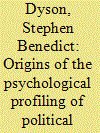

|
|
|
|
|
| Publication |
2014.
|
| Summary/Abstract |
The US intelligence community prepares occasional psychological profiles of foreign political leaders. The origins of these practices lie in frantic and ad hoc attempts to understand the character of Adolf Hitler during the latter stages of the Second World War. The US Office of Strategic Services (OSS) commissioned profiles of Hitler, contracting with a titan of personality theory in Professor Henry A. Murray and practicing psychoanalyst Walter C. Langer. Reconstructing the history of these profiles grounds the contemporary analysis of foreign leaders in the lessons of the pioneers. Useful insights on the challenges of profiling leaders, the relationship of academic theories - and academic personnel - to government, and the role of intelligence in policy abound.
|
|
|
|
|
|
|
|
|
|
|
|
|
|
|
|
| 19 |
ID:
145725
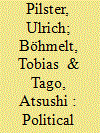

|
|
|
|
|
| Summary/Abstract |
Several studies have claimed that changes in the political leadership of a country affect foreign policy decision making. The following paper systematically tests this in the context of states' participation in military coalition operations. By building on previous theoretical models, the authors argue that new leaders may differ from their predecessors in that the former (i) have dissimilar preferences with regard to the involvement in military interventions, (ii) evaluate relevant information differently, and (iii) are less likely to be entrapped in intervention policies. Ultimately, the net effect of these factors should make it more likely that political leadership turnovers are associated with premature withdrawals from ongoing military coalitions. The theory is tested by quantitative analyses of newly collected data on military coalition operations in 1946–2001 and a qualitative case study. The authors find strong and robust support for their argument.
|
|
|
|
|
|
|
|
|
|
|
|
|
|
|
|
| 20 |
ID:
127023
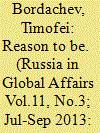

|
|
|
|
|
| Publication |
2013.
|
| Summary/Abstract |
One day in 2009, when France, headed by Nicolas Sarkozy, was completing formalities for rejoining the integrated military command of NATO, the newspaper Liberation published a cartoon depicting the ghost of General de Gaulle, who during his rule had seriously reduced the country's participation in the Alliance. The ghost was hanging over the Sarkozy-Bruni couple, hunched in a corner of their bed, and commanded: "And now, my son, conquer Algeria back!" The joke proved to be prophetic, considering NATO's military operation against Libya in 2011, in the organization of which the Elysee Palace took the most active part of all the allies.
|
|
|
|
|
|
|
|
|
|
|
|
|
|
|
|
|
|
|
|
|